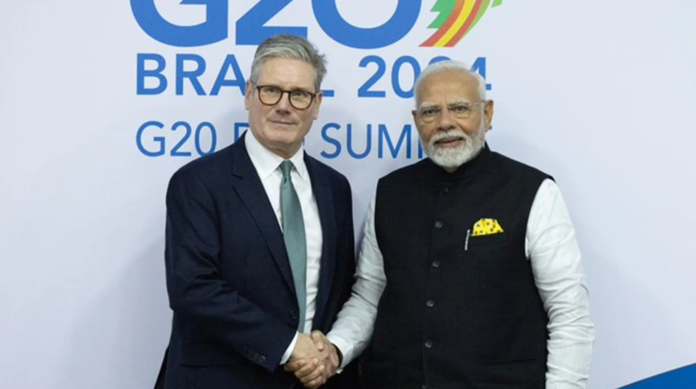The UK-India Free Trade Agreement (FTA) is scheduled to relaunch in early 2025, marking an important step in strengthening economic ties between the two nations. This development follows a meeting between UK Prime Minister Keir Starmer and Indian Prime Minister Narendra Modi during the G20 summit, reaffirming their shared commitment to enhancing bilateral trade and cooperation.

Table of Contents
Why the UK-India FTA Matter
Boosting Economic Growth
The FTA is expected to open doors for increased trade and investment between the two nations. In 2023-24, trade between the UK and India reached $21.34 billion, with UK exports contributing $16.6 billion. A finalized agreement could significantly boost these figures, benefiting industries and creating jobs in both countries.
Expanding Trade Opportunities
The deal aims to reduce tariffs and improve market access. For instance, the UK is eager to lower duties on exports such as scotch whiskey, electric vehicles, and confectionery. India, on the other hand, seeks greater access to the UK’s service sectors, including IT, telecommunications, and financial services.
Strengthening Strategic Co-operation
Beyond trade, the FTA has potential to foster collaboration in critical areas like technology, education, security, and climate change. This partnership could lay the groundwork for long-term mutual benefits.
Key Issues in Negotiation
Market Access
Both nations are pushing for better access to each other’s markets. India wants tariff-free access for textiles, pharmaceuticals, and skilled professionals in sectors like IT. The UK is negotiating to ease barriers for its luxury goods and agricultural products.
Investment and Intellectual Property
A Bilateral Investment Treaty (BIT) is under discussion, covering goods, services, and intellectual property rights. With UK businesses already supporting over 600,000 jobs in India, further investment ties could be transformative.
Labour and Environmental Standards
The UK wants labour and environmental provisions included, reflecting its sustainability goals. India has expressed concerns, as such policies could require domestic adjustments and impact industries like textiles.
Visa Provisions
India is advocating for easier visa access for professionals, while the UK seeks to balance this with domestic priorities. Resolving this issue will be key to finalizing the agreement.
Opportunities and Challenges
Benefits of the FTA
For India, access to the UK’s advanced technology and education sectors could be invaluable. The UK, in turn, stands to benefit from India’s growing consumer market and its rapidly developing renewable energy and digital sectors.
Negotiation Hurdles
Challenges include differing stances on labour laws, environmental standards, and visa regulations. These issues require careful negotiation to strike a balance that benefits both sides.
My Perspective
The UK-India FTA holds great promise for both nations, offering a chance to deepen their economic and strategic ties. While challenges exist, the willingness of both governments to engage in dialogue is encouraging. Striking a deal will require compromises, but the potential rewards make it worthwhile. By fostering innovation, creating jobs, and enhancing market access, the FTA can strengthen the partnership and drive progress for years to come.
Conclusion
The relaunch of the UK-India FTA represents an important step in redefining bilateral relations. Both nations stand to gain from this partnership, provided they address the key negotiation hurdles. If successful, this agreement will not only boost trade but also pave the way for deeper cooperation in technology, education, and sustainability. The FTA’s impact could resonate far beyond economics, shaping the future of UK-India relations.



